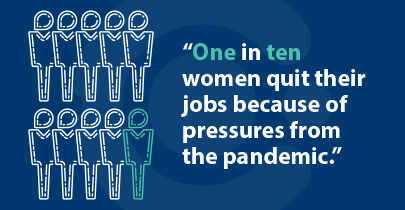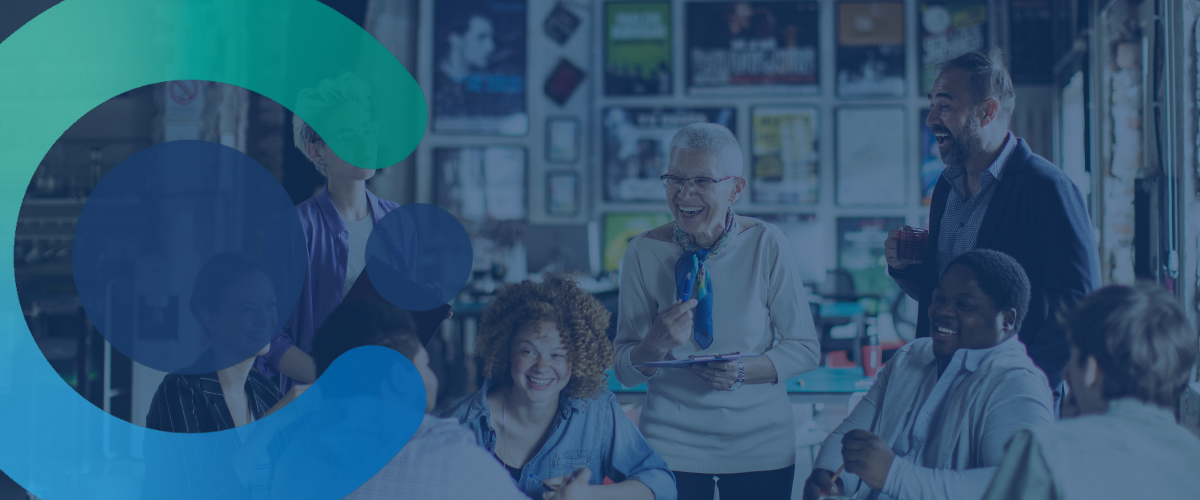The phrase, ‘Glass ceiling’ was first used to describe the unacknowledged barrier to women advancing in the workplace over 40 years ago. Since then, we’ve seen exceptional women excel at some of the most high-profile jobs in the world. Whether it’s our own Mary Robinson becoming Ireland’s first female president or Angela Merkel being German chancellor for over a decade, women have become a force to be reckoned with in the world. However, these high-flying success stories mask an ugly truth about how well women and minorities fair in the workplace today.
A Pew Research Centre study showed 40% of women had experienced discrimination because of their gender. And while the general assumption is the glass ceiling is slowly cracking, a recent report by Deloitte found that 51% of women are less optimistic about their careers now than they were before the pandemic.
The good news is the continued build-up of evidence showing the ‘relationship between diversity on executive teams and the likelihood of financial outperformance’. McKinsey’s Diversity Series finds overall slow growth in diversity covers up the success of diversity winners, especially those who adopt a systematic business-led approach to inclusion.
One company that has adopted a deliberate approach to D&I is Galway based Diligent, a leading governance, risk, and compliance SaaS company serving more than one million users from over 25,000 organizations around the globe.
Siobhan O’Shea, Client Services Director with Cpl and Head of Diversity and Inclusion for the Future of Work spoke with Diligent's HR Director about their approach to D&I in the workplace. We’ve condensed their conversation; however, you can watch their discussion in full below.
Diligent’s Diversity and Inclusion Strategy
Siobhan: It sounds like it's been an incredibly busy period for you and Diligent. Why has Diligent put such an emphasis on its D&I strategy?
HR Director at Diligent: First and foremost, Diligent has work to do in this space. I think it's important to be upfront about that.
Even on a personal level, Diversity and Inclusion in the workplace isn't a topic that I feel like I'm an expert on, but I want to learn. I want to improve, become more aware of the unconscious biases within myself and around me. I want to be able to speak up when I see that bias and make sure others are empowered to do the same thing and that's echoed in Diligent’s strategy. The foundation of our strategy is that we strive to create a diverse workforce where everybody has a sense of belonging and can bring their real selves to work every day. It’s just the right thing to do.
Leadership’s role in ensuring Diversity and Inclusion
A huge number of studies have shown that diverse workplaces have the best talent, increased employee engagement, and drive company profitability. It is about doing the right thing and admitting that there's work to do and having a plan in place is essential. I think it's important that leaders within an organisation champion diversity and inclusion. There must be accountability for driving outcomes. You can have all the best D&I programmes in the world, but if leadership isn't held accountable, it'll fall flat.
Reviewing People and Talent Processes
The second big thing and this is hugely important, is reviewing our people and talent processes. It’s imperative to mitigate against implicit bias at the systemic level, and we need to look critically across all our processes. Things like hiring, selection, career, mobility, it's a massive priority for the business right now and we need to implement the necessary policy changes.
It’s also important to review our specific job specs to make sure we're using inclusive language. We want to make sure that everybody has access to resources and education in this space so that we foster understanding.
Employee Resource Group
Another major focus for us is our Employee Resource Group Programme. We've recently launched new interest groups including women in tech, generational, parenting, mental health, remote work, and Pride. I think the real benefit of that is that it creates a community amongst populations, and it brings that opportunity for cross-cultural communication, raises awareness, helps to educate employees, and really helps us to build a great talent pipeline as well.
Diversity and Inclusion Post Pandemic
Siobhan: How do you think the pandemic has impacted your diversity strategy and how are you addressing that?
HR Director at Diligent: I read a really interesting Forbes article on this a couple of months ago, so some of what I reference here is from that, but the bottom line to ensuring a level playing field between those remote, those in the office, and those hybrid workers was acknowledging and addressing the biases that managers/leadership and company systems can hold towards those different type of employees
Remote working and hybrid working has certainly had an impact on how we approach our strategy and the things that we need to be aware of and to plan for. I think D&I can often be thought of in terms of gender, race, and other protected characteristics, but adding remote and hybrid working brings an extra challenge to the forefront. The move to remote work during COVID was loved by some, not as warmly embraced by others, and there was a real mix of pros and cons depending on your personal preferences and lots of different factors. The bottom line is really making sure that there's a level playing field between those who are remote, those in the office, and hybrid workers. You'll often hear employees say they struggle to get visibility and have their accomplishments recognised because they're away from the core of the workplace, and that's just heightened even more now.
There are a few key things we can do in this space. We need to think creatively about informal training and development opportunities in and out of the office. I think we need to look critically at evaluation and assessment systems. Peer manager feedback is very liable to proximity bias and so we need to think about how we account for that. We need to train managers in that space and deliberately create moments of connection so that culture networks can be built out in ways that would have traditionally been done in the office. One thing that's important is monitoring advancement, how are those employees who are not as frequently in the office progressing when you compare them to those who are? I think that would be a measure of whether hybrid work is differentiating negatively, and we need to really monitor that and pivot in real-time when those gaps start to appear.
Diligent’s Modern Leadership Initiative
Siobhan: It's going to be very interesting times ahead with the challenges and opportunities, the new ways of working present all of us. Can you tell us about Diligent’s Modern leadership initiative for customers?
HR Director at Diligent: One of the things about diversity and inclusion that's important is that you don't just talk about it, you need to really implement it. A big way to really drive it is to make sure that it's centered in your business strategy and what I love about Diligent is that we have products that are doing just that. With the span of influence that we have across more than 700,000 plus board members and leaders, we realised that we really had a huge opportunity to be able to influence very senior people across different organisations when it comes to diversity and inclusion.
Figures from 2019 had shown that only 5% of CEOs of Fortune 500 companies were female, so we created the Modern Leadership initiative with the premise that diverse leadership is essential to modern governance. We launched this last June to champion diversity at the board and executive level and to make sure, that customers had the right resources at their fingertips to identify and connect with fantastic, diverse talent.

Gender Diversity in the Workplace
Siobhan: Those stats you shared are shocking especially when you hear only 5% of Fortune 500 CEOs are female? Gender diversity within the tech world is a huge challenge but equally presents a significant opportunity. How are we seeing that manifest in Diligent?
HR Director at Diligent: There are multiple challenges at play to getting women into the workforce, especially after having children. For example, here in Ireland the high cost of childcare, or the lack of availability can be a prohibitive factor in getting women into the workforce after they've had kids. I've heard so many anecdotes recently about childminders leaving the market because their job was no longer viable. Especially now with COVID restrictions and increasing insurance costs, it's tough for the industry. It’s really tough, and if that service isn’t there or if it’s just too expensive, then oftentimes you will hear women say it’s just not worth it to go back to work.
It was reported by the National Women Council of Ireland back in April that one in ten women had quit their jobs because of pressures of the pandemic and homeschooling. The impact is going to be felt for a long time, but there are certainly things we can do about it. At the company level, we need to make sure we're sourcing in the right places. We need to have diverse interview panels and internal policies that demonstrate compassion for those sorts of situations. We need to offer flexibility where possible. It’s also important that companies don’t have a bias against people who were out of work for a period, and to offer reskilling opportunities, good training programmes to return to work.
Siobhan: What would you say to job seekers who are interested in a career at Diligent about your plans moving forward and around your D&I strategy?
HR Director at Diligent: The first thing that I will say if you're interested in a career at Diligent is to go and explore our newly launched website Diligent.com. You can get a real feel for the organisation, the products, and the values there. Recruitment is through Cpl for our Galway location.
If you'd like to learn more about how you can implement a successful Diversity and Inclusion strategy, get in touch with our experts.
Sources:
* Source: Why Is Diversity & Inclusion in the Workplace Important? Research by Great Place to Work, April 2021.
*Source: The Fortune 500 Has More Female CEOs Than Ever Before. Research by Fortune, May, 2019.
*Source: One in 10 women quit jobs over pressure of juggling work and pandemic home life. Research by National Women's Council of Ireland and referenced by the Irish Examiner, April 2021.
*Source: What Is the Glass Ceiling and How Do We Break It? Research by BuiltIn
*Source: Gender discrimination comes in many forms for today’s working women Research by Pew Research Center, December 2017
*Source: Women @ Work A global outlook, Research by Deloitte,2021
*Source: Diversity wins: How inclusion matters, Research by McKinsey and Company, May 2020
